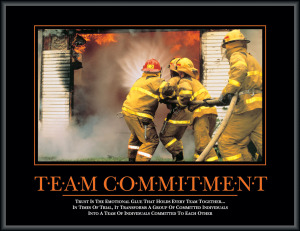During a recent workshop I facilitated for a large team we started a discussion on the idea of consensus versus commitment. During the discussion the leader of the team pushed back on the differentiation of the two concepts. While the two words on the surface might seem similar, they are materially different in their definition.
Again, a visit to my favorite dictionary site (www.m-w.com) we learn the definitions are:
- Consensus: a general agreement about something: an idea or opinion that is shared by all the people in a group
- Commitment: a promise to do or give something: a promise to be loyal to someone or something: the attitude of someone who works very hard to do or support something
I do believe that consensus on its own can be a dangerous concept for organizations. In my experience all too often, consensus is not real, most especially in a business setting. Consensus that is not real or is false, feels like an attempt to make everyone happy through a decision that includes everyone’s input, offends no one and often has no weight because it has been compromised to death. False consensus is not having the conflict needed to hear everyone’s opinions and promoting a safe environment to do so. Instead, and all too often teammates just nod and go on.
When consensus comes about naturally it is wonderful because it can move people automatically to commitment, but generally, consensus is a way of ensuring mediocrity. Gaining commitment is going steps beyond consensus. Gaining commitment is about teammates buying in to a decision, idea, process, etc., precisely when they don’t naturally or want to agree. To make that happen a leader needs to promote conflict, an airing of opinions so decisions can be made having factored in all of the various ideas, opinions, and feedback from their team.

When a team commits to decisions, processes, etc., they are doing so because they know how to embrace two separate but related concepts: buy-in and clarity. Patrick Lencioni, author of The Five Dysfunctions of a Team: A Leadership Fable, shares that buy-in is the achievement of honest emotional support and clarity is the removal of assumptions and ambiguity from a situation.
I really appreciate the image above because I think it illustrates the point well. A fire captain might get consensus from his/her firefighters around the idea of how they need to fight a fire, but gains commitment to the decisions once they are made despite whose idea it was. Even though there is the element of urgency involved in this analogy, is that not something that is frequently lacking in organizations?
Regardless if you are non-profit, church, business, or a governmental body gaining commitment can mean the difference between life and death of the organization. Commitment to a decision drives action internally, while consensus promotes a broad external drive, and unless, as a leader, you micromanage and dictate every step, commitment ensures empowerment, accountability, and buy-in to achieve goals beyond your wildest dreams.
